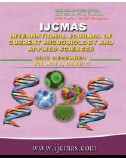


 National Academy of Agricultural Sciences (NAAS)
National Academy of Agricultural Sciences (NAAS)

|
PRINT ISSN : 2319-7692
Online ISSN : 2319-7706 Issues : 12 per year Publisher : Excellent Publishers Email : editorijcmas@gmail.com / submit@ijcmas.com Editor-in-chief: Dr.M.Prakash Index Copernicus ICV 2018: 95.39 NAAS RATING 2020: 5.38 |
The biotechnological intervention to enhance crop productivity via genetic transformation mainly depends upon an efficient regeneration protocol. Japonica, Indica and Basmati varieties of rice vary highly in their regeneration capabilities. Establishment of a highly efficient regeneration system for mature embryos in rice will enable transformation of foreign genes in rice. In this study, 12 genotypes of rice representing japonica, indica and basmati varieties were assessed for their calli and green plant regeneration frequencies. The mature seeds of the genotypes were inoculated on MS media supplemented with auxin (2,4-D @ 2.5 mg/l), cytokinin (kinetin@ 0.5mg/l) and 3% sucrose. They exhibited variable calli induction and green plant regeneration frequencies. Calli regeneration frequency ranged from 100% - 20%, highest being in GS-88, Kamad and PS-3 (100%) and lowest in Kohsar (20%). Highest regeneration frequency was obtained in K-332 and Kamad. Among all the varieties K-332, GS-88 and Kamad performed well in respect of callus induction and green plant regeneration. The plants were successfully acclimatized and transferred to pots.
 |
 |
 |
 |
 |